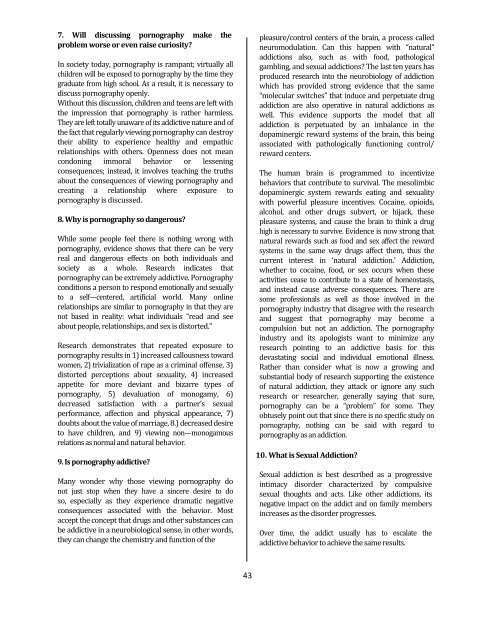Safety Net
Safety Net
Safety Net
Create successful ePaper yourself
Turn your PDF publications into a flip-book with our unique Google optimized e-Paper software.
7. Will discussing pornography make the<br />
problem worse or even raise curiosity?<br />
In society today, pornography is rampant; virtually all<br />
children will be exposed to pornography by the time they<br />
graduate from high school. As a result, it is necessary to<br />
discuss pornography openly.<br />
Without this discussion, children and teens are left with<br />
the impression that pornography is rather harmless.<br />
They are left totally unaware of its addictive nature and of<br />
the fact that regularly viewing pornography can destroy<br />
their ability to experience healthy and empathic<br />
relationships with others. Openness does not mean<br />
condoning immoral behavior or lessening<br />
consequences; instead, it involves teaching the truths<br />
about the consequences of viewing pornography and<br />
creating a relationship where exposure to<br />
pornography is discussed.<br />
8. Why is pornography so dangerous?<br />
While some people feel there is nothing wrong with<br />
pornography, evidence shows that there can be very<br />
real and dangerous effects on both individuals and<br />
society as a whole. Research indicates that<br />
pornography can be extremely addictive. Pornography<br />
conditions a person to respond emotionally and sexually<br />
to a self-centered, artificial world. Many online<br />
relationships are similar to pornography in that they are<br />
not based in reality: what individuals “read and see<br />
about people, relationships, and sex is distorted.”<br />
Research demonstrates that repeated exposure to<br />
pornography results in 1) increased callousness toward<br />
women, 2) trivialization of rape as a criminal offense, 3)<br />
distorted perceptions about sexuality, 4) increased<br />
appetite for more deviant and bizarre types of<br />
pornography, 5) devaluation of monogamy, 6)<br />
decreased satisfaction with a partner’s sexual<br />
performance, affection and physical appearance, 7)<br />
doubts about the value of marriage, 8.) decreased desire<br />
to have children, and 9) viewing non-monogamous<br />
relations as normal and natural behavior.<br />
9. Is pornography addictive?<br />
Many wonder why those viewing pornography do<br />
not just stop when they have a sincere desire to do<br />
so, especially as they experience dramatic negative<br />
consequences associated with the behavior. Most<br />
accept the concept that drugs and other substances can<br />
be addictive in a neurobiological sense, in other words,<br />
they can change the chemistry and function of the<br />
43<br />
pleasure/control centers of the brain, a process called<br />
neuromodulation. Can this happen with “natural”<br />
addictions also, such as with food, pathological<br />
gambling, and sexual addictions? The last ten years has<br />
produced research into the neurobiology of addiction<br />
which has provided strong evidence that the same<br />
“molecular switches” that induce and perpetuate drug<br />
addiction are also operative in natural addictions as<br />
well. This evidence supports the model that all<br />
addiction is perpetuated by an imbalance in the<br />
dopaminergic reward systems of the brain, this being<br />
associated with pathologically functioning control/<br />
reward centers.<br />
The human brain is programmed to incentivize<br />
behaviors that contribute to survival. The mesolimbic<br />
dopaminergic system rewards eating and sexuality<br />
with powerful pleasure incentives. Cocaine, opioids,<br />
alcohol, and other drugs subvert, or hijack, these<br />
pleasure systems, and cause the brain to think a drug<br />
high is necessary to survive. Evidence is now strong that<br />
natural rewards such as food and sex affect the reward<br />
systems in the same way drugs affect them, thus the<br />
current interest in ‘natural addiction.’ Addiction,<br />
whether to cocaine, food, or sex occurs when these<br />
activities cease to contribute to a state of homeostasis,<br />
and instead cause adverse consequences. There are<br />
some professionals as well as those involved in the<br />
pornography industry that disagree with the research<br />
and suggest that pornography may become a<br />
compulsion but not an addiction. The pornography<br />
industry and its apologists want to minimize any<br />
research pointing to an addictive basis for this<br />
devastating social and individual emotional illness.<br />
Rather than consider what is now a growing and<br />
substantial body of research supporting the existence<br />
of natural addiction, they attack or ignore any such<br />
research or researcher, generally saying that sure,<br />
pornography can be a “problem” for some. They<br />
obtusely point out that since there is no specific study on<br />
pornography, nothing can be said with regard to<br />
pornography as an addiction.<br />
10. What is Sexual Addiction?<br />
Sexual addiction is best described as a progressive<br />
intimacy disorder characterized by compulsive<br />
sexual thoughts and acts. Like other addictions, its<br />
negative impact on the addict and on family members<br />
increases as the disorder progresses.<br />
Over time, the addict usually has to escalate the<br />
addictive behavior to achieve the same results.


